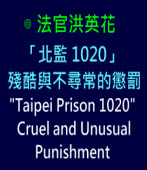|

「北監 1020」殘酷與不尋常的懲罰
("Taipei Prison 1020", Cruel and Unusual Punishment)
◎ 法官洪英花 (Judge Hong Yin-Hua)
一、自由縱剝奪、人性尊 嚴不容踐踏:馬英九總統98年5月14日 簽署公民與政治權利國際公約第10條「自由被剝奪之人,應受合於人道及尊重其天賦人格尊嚴之處遇。」自由被剝奪之人,除喪失人身自由外,其生命健康權、人 性尊嚴等憲法保障之基本人權,與一般人所享有者,並無不同(司法院釋字第653號參照)。
1) Even though one can be stripped off his/her liberty, the dignity of a human being must not be demeaned: President Ma signed United Nations' International Covenant on Civil and Political Rights on May 14, 2009. Article #10 of the Covenant states "All persons deprived of their liberty shall be treated with humanity and with respect for the inherent dignity of the human person." A person deprived of his/her liberty should still have basic human rights to life, health, and dignity protected by the Constitution (Taiwan Judicial Case #653).
德國聯邦憲法法院曾指 出「兩個受刑人在7.6平方公尺(即 2.299坪)面積的牢房中共同監禁是侵害人性尊嚴。」依〈法務部指定各監獄收容受刑人標準表〉核定每人居住空間0.7坪,法務部資料坦承目前每名受刑人 使用面積約0.56 坪,顯不符合人道最低標準,而有違反公約第10條。我國牢房空間配置,悖離聯合國、法務部核定標準及人性對待。更有立委指出,法務部秀出總統牢房照片,美 國友人形容是50年前的美國監獄。
A decision by German Federal Constitution Court states "Two inmates incarcerated in a 7.6 square meters (about 81 square feet or 2.299 pin) cell is a violation of human dignity". According to the regulation of Taiwan's Justice Department, the minimum cell area per inmate should be 0.7 pin (24.66 square feet). However, according to Justice Department, the actual cell size for each inmate is only 0.56 pin (19.7 square feet), a clear violation of the minimum standard of humane treatment and article #10 of the Covenant. Some legislators of Taiwan pointed out that the picture of the cell, released by the Prison authority, in which President Chen was incarcerated, is similar to the cell in the US, 50 years before, according to their friends from the States.
陳總統的司法案件無論是 非曲直為何,在長期監禁下,有必要審視其身為人 的基本尊嚴有無遭剝奪、甚至踐踏?!臺灣號稱「人權立國」,馬總統簽署兩公約且曾為法務部長,理應要求各級政府機關行使職權應符合兩公約有關人權保障規 定,並應積極促進各項人權實現,卻漠視卸任總統(或政敵)人性尊嚴遭此踐踏,臺灣國際形象斲傷,莫此為甚?!
Let's put aside the legality of the charges against President Chen for now. Because he has been imprisoned for an extended period, it is necessary to examine if his basic human rights and dignity have been deprived and demeaned. If Taiwan prides itself as "a country established with human rights", President Ma, who signed the Covenant and was Secretary of Justice Department before, must strive to fulfill and comply the Covenant by requiring the government officials to observe the human rights as defined by the Covenant. However, President Ma pretermits his predecessor (or his political foe) to be deprived his dignity in such way that it has severely damaged the international reputation of Taiwan.
二、殘酷與"不"尋常的 懲罰:公民與政治權利國際公約第6條「人人皆有 天賦之生存權,此種權利應受法律保障。」生命權為固有權,我國憲法明定生存權保障,健康權為生存權之延伸,健康權之具體實現,則為醫療人權(憲法第15、 22、157條、增修條文第10條第5、7、8、9、12項參照)醫療人權指每個人都具有以人格主體者之地位,有尊嚴的要求醫療照護及保健。美國為例,監 所機構依法有義務提供受刑人充足的醫療照護,若醫療保健不當,違反憲法第8條「殘酷與不尋常的懲罰」,聯邦最高法院曾認「監獄如果故意不關心受刑人迫切醫 療需求,將構成憲法第8條之處罰。」報載法務部之前忽略總統醫療需求及舍房居住時間過長,已構成「殘酷與不尋常的懲罰」。生命無價,任何受刑人之醫療照護 皆應正視,滿足受刑人醫療需求為國家之責任。若陳總統照護及醫療保健呈闕漏,應審慎評估監獄行刑法第58條適用面。
2) Cruel and Unusual Punishment: Article #6 of the International Covenant on Civil and Political Rights states "Every human being has the inherent right to life. This right shall be protected by law. No one shall be arbitrarily deprived of his life." The Constitution of Taiwan also specifies clearly the protection for the right to life. The right to health is an extension of the right to life. To protect the right to health, one must have the basic human rights to receive proper medical treatment (see Taiwan Constitution Article #15, 22, 157, and Amendments #10.5-10.9, and 10.12) . Basic human rights for medical treatments dictate that each person must receive sufficient medical treatments with dignity. For example, the prison authority in the US is required by law to provide all inmates with proper medical care. Otherwise, it would violate the Eighth Amendment of the Constitution and constitutes "cruel and unusual punishment". The US Supreme Court has decided that if "Prison authority intentionally neglects urgent medical needs of an inmate, it constitutes the cruel and unusual punishment defined by the Eighth Amendment." From news reports, the Justice Department of Taiwan disregards the medical needs of President Chen and keeps him in a cell for extended long hours, which constitutes the "cruel and unusual punishment". Life is priceless. Every inmate has the right to proper medical treatments. It is the responsibility of the government to ensure that each inmate receive proper medical treatments. If the prison authority cannot provide the needed medical treatments for President Chen, it should apply Article # 58 of the Prison Law to allow President Chen a medial bail or treatments in a hospital.
三、天賦生命、不容國權侵害:國權侵害人權,是恐怖時代的產物。 任何人皆無權因意識型態、理念不合、憎惡或偏聽少數人言論而剝奪他人之生命健康權。兩人1.38坪牢房致健康亮紅燈,若有不測,由誰承擔?一個任令卸任總 統倒臥監獄的國家,正凸顯我國獄政背離現代醫療人權思潮的諸多弊端,該保外就醫或特赦?敬謹以尊憲、尊重生命方式處理吧!
3) Inherent right to life shall not be violated by the government power: Only in a terror era of a dictatorship, there exist pervasive human rights violations by the government power. Nobody has the power to deprive the right to life and health of another person due to differences in ideologies, personal likes and dislikes, and the biased opinions of a few people. President Chen is in a frail state of health due to his incarceration in a cell of 50 square feet with one other inmate. Who could take the blame if he dies because of this imprisonment condition? If we stay on the sideline and let a former President languish in illness in a prison cell, it embodies a serious flaw of our prison system, a significant departure from the current trend of human rights to medical treatment, and a failure of us as a nation. Should President Chen be allowed for a medical bail or a Presidential Pardon? Please made an adequate decision by observing the Constitution and respecting inherent human right to life.
(作者現任法官)
自由時報 2012-03-21
(The author is a Judge of Taipei District Court)
Liberty Times, 3-21-2012
source: 台灣e新聞
|